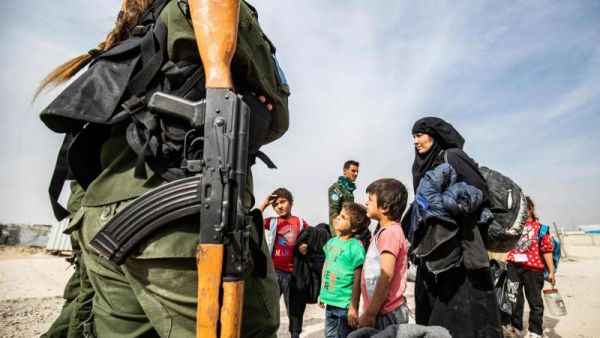The attempt by Daesh to create the so-called Islamic state in Syria and Iraq attracted volunteers from many nations. The children of these volunteers, many of whom were born in Syria, now pose a unique dilemma for those nations.
It is estimated that about 70,000 women and children are detained in the refugee camps in Northern Syria. Of that number, at least 12,000 are foreign nationals. Two-thirds of the children held there are under the age of 12, with the majority under five years old, according to a report by the UNHCR. More than 500 people died in the camps in 2019 and researchers found that 371 of them were children.
#YPJInternational fighter speaking with some of the #children. There were so many in the civilian-place in #DeirEzZor. They will never live under #ISIS #Daesh again, because #YPJ #YPG #YPGInternational #YPJInternational #QSD #SDF liberated together the NorthEast of #Syria pic.twitter.com/fOMRpL0hlT
— YPJInternational (@YPJInternation3) February 5, 2019
These youngsters are, first and foremost, a vulnerable group in need of urgent assistance in a volatile and war-torn region. The urgency of resolving the question of how to manage their cases cannot be overstated, given the instability in the region and the ongoing threat posed by the coronavirus disease (COVID-19). If not dealt with, the challenge these children present runs a serious risk of developing from an easily solved welfare issue into a possible security and counterterrorism issue.
“Despite the fact that a single child made me go there,most of the children were suffering the same trauma.All of them were carrying traces of DAESH & none of them was aware of it.
— Yazidi الايزيدية (@Ezidi2) August 8, 2018
The pain of the #Yazidi ppl in a psychologist’s experience#YazidiGenocide https://t.co/0BaqeQtOav pic.twitter.com/GMDzJHRxUH
It is in the short and long-term interests of all nations to take action over the children left behind in areas once held by the now-vanquished Daesh. Moreover, it is ethically and legally a certain and necessary course of action. Under international law, children are the responsibility of their home countries, and the authorities there need to address their future welfare and rehabilitation prospects.
Islamic State did this in the 21st century.
Imagine the Islamic States of the 15th century. https://t.co/45oaS2sWFZ— Sankrant Sanu सानु संक्रान्त ਸੰਕ੍ਰਾਂਤ ਸਾਨੁ (@sankrant) February 10, 2021
To begin with, diplomatic and financial resources need to be invested in the development of infrastructure to provide for the needs of the remaining populations in the camps (including health services, housing, clothing and food) until a long-term solution has been decided. Such small investments should be seen as the first step toward avoiding the expenditure of greater resources — on measures such as possible military action, expensive repatriations and incarceration — in the future.
"In one instance, an Iraqi woman was barred from communicating with her neighbors after she removed her veil. In another, the children of alleged Islamic State fighters tried to bury a young Iraqi boy alive" - the reality of #ISIS rule in al hol camphttps://t.co/aEdEao4o2L
— Norma Costello (@normcos) September 4, 2019
Secondly, the creation of a UN body to investigate the actions of Daesh supporters would benefit their children. It would serve to share information about suspects, and work closely with child-protection services in their countries of origin to determine the best outcome for the youngsters.
WATCH: @RichardEngel reports on the women and children of ISIS fighters, who are living at the Al Hol camp in northern Syria. #OnAssignment https://t.co/siGgo8NcdR
— MSNBC (@MSNBC) September 23, 2019
Thirdly, the children of Daesh supporters must receive secular education, as per international law, to ensure they have a viable future. Religious education must be provided by Muslim-led welfare groups to reinforce a positive religious identity — to counter propaganda — and a sense that detainees do not need to renounce their religion to move forward with their lives (as Daesh propaganda would have them believe).
Finally, juvenile rehabilitation facilities that are already operating in northeastern Syria need resources and expertise from donor states and international nongovernmental organizations (NGOs). These facilities offer a way to immediately reduce the risks to European children while efforts to find longer-term solutions, such as repatriation, continue.
Several NGOs are already carrying out safeguarding and rehabilitation efforts in neighboring countries, including Iraq and Turkey. International support would vastly increase the capacities of such facilities.
Dr. Azeem Ibrahim is a director at the Center for Global Policy and author of “The Rohingyas: Inside Myanmar’s Genocide” (Hurst, 2017).








